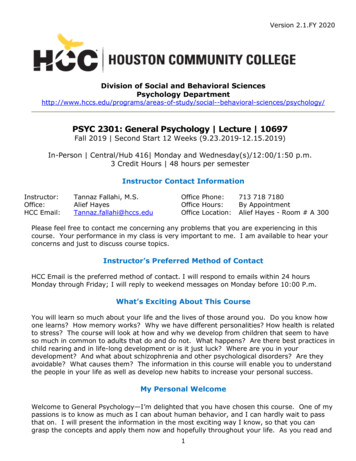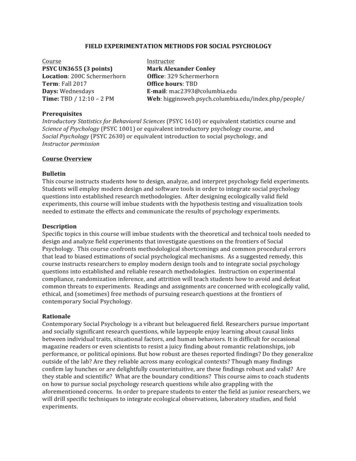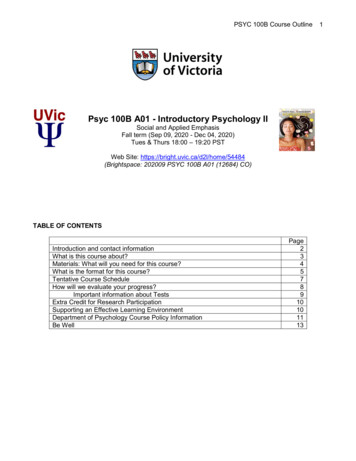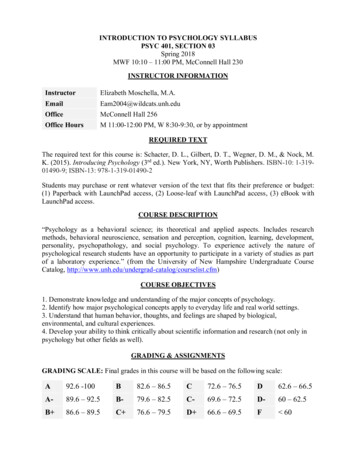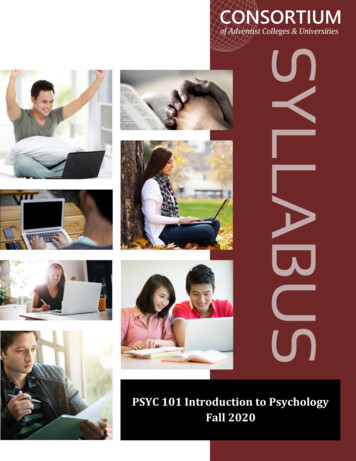
Transcription
PSYC 101 Introduction to PsychologyFall 2020
PSYC 101 Introduction to PsychologyConsortium of Adventist Colleges and UniversitiesInteractive Online FormatThis course follows an interactive online format and has Sunday/Thursday deadlines eachweek. You are expected to login regularly during the course to participate in the onlinediscussions. Please plan accordingly. Please review the Dates & Deadlines widget on theright side of your course in LearningHub for the last day to withdraw for a fullrefund.Instructor ContactInstructor: Penny Webster, Ph.D.Email: penelopew@andrews.eduPhone: 27-21-856-2403 (Note time zone difference: ET 7 hours) If you wish to talk withme, let me know a time that will work for you and we can set up a Zoom meeting, Skype call, orWhatsapp ( 27-71-078-7198) at a mutually suitable time.Communication with your InstructorIt is important to remember that while the Internet is available 24 hours a day, your instructor isnot. You can expect that I will respond to an e-mail message from you within one (1) businessday during the week, but may not be available on the weekends.Other AssistanceUsername and password assistanceEnrollment and withdrawal questionsQuestions regarding course contentTechnical assistance with online coursesTechnical assistance with LaunchPadExam requests and online proctoringDistance Student Services - any other ents@andrews.edu(269) 471-6016(269) 471-6323 27-71-078-7198(269) 471-39601-800-936-6899(269) 471-6566(269) 471-6566Part 1: Course InformationCourse DescriptionsPrinciples of psychology including the study of growth, perception, learning, thinking,motivation, emotion, personality, and mental health.Required Text/MaterialThe required text for this course is an e-book, embedded in its companion workbook,LaunchPad, which contains assigned interactive learning activities.Myers, D. G., & DeWall, C.N. (2019). Exploring Psychology, 11th edition. ISBN:9781319127787 Purchase directly from the publishers’ website (this is the most economicaloption).Last Updated: 8/13/2020Page 2
PSYC 101 Introduction to PsychologySyllabusNew to this 11 edition of our text is the fact that you can download the e-book foroffline reading, and that you can also link in to an audio version of the text andlisten to the content! Fun ways to interact with the course content.ORShould you prefer to use a print copy of the textbook, note the following option as you purchase:Loose leaf sheets copy (most economical print version):Myers, D. G., & DeWall, C.N. (2019). Exploring Psychology, 11th edition, with LaunchPadaccess code. ISBN: 9781319127763NOTE: It is most important that if you choose to purchase a print textbook to make surethat your purchase comes with a LaunchPad access code—which may not be so if youpurchase a used book or perhaps choose to rent a book! You will need this access code toregister on the LaunchPad companion workbook site for this course.Credit Hour and CommitmentThis course is offered for 3 semester credits; therefore it is expected that you will spend aminimum of 135 total hours on this course. This translates to a steady 8-10 hours each week. Itis very important that you budget and distribute your time well, setting aside at least three work‘sessions’ each week. ‘Distributed practice’ has been shown to greatly improve learning. Planfor the time you will need to carefully read/study through your course content and text chapters,for participation in the learning activities and discussion forums, and for taking chapter quizzes,midterm and final exams. Set your own deadlines well ahead of those stipulations. Remember,it is always an advantage to work ahead!A recommended weekly schedule to divide your time is provided:Readings: 3 hoursLecture Overview: 30 minsLaunchPad Assignments: 2 hoursInteractive Discussions: 30 minsWeekly Quiz: 1 hourWeekly work towards Final Group Project: 1 hourRegular revision in advance preparation for quizzes and exams: 1 hourLast Updated: 8/13/2020Page 3
PSYC 101 Introduction to PsychologySyllabusProgram Learning Outcomes (PLO)1. Students will think critically about human thought and behavior in individuals, socialcultural, and ecological systems. (Introductory level)2. Students will write effectively about theories, data, and research in the behavioralsciences. (Introductory level)Student Learning OutcomesOutcome1.2.3.4.Develop an appreciation for how ‘fearfully and wonderfullymade’ God’s human creation is by examining the intricacy andcomplexity evidenced in human behavior, thought-processes,and emotions.Evaluate claims about human behavior using knowledge ofpsychology, the scientific method and an integration of biblicalfoundations.Gain an understanding of the concepts and terms in themany areas of psychology, including: significant schools ofpsychology, research methods, sensation, perception, learning,memory, thinking, language and intelligence, humandevelopment, emotions, stress and health, personality, socialpsychology, psychological disorders, and psychotherapies.Become aware of the major psychological approaches to thestudy of behavior and mental processes.5.Become familiar with major research findings and theoriesof the field.6.Understand that theories and principles of psychology apply toeveryday behavioral issues.7.Apply psychological principles to your own life to gain a betterunderstanding of human diversity, developing a betteracceptance of yourself and others.Learning ActivitiesAU UFOsChapter overviews Weekly classemailsBiweekly discussions/Reflective blogChapter overviewsWeekly class emailsLaunchpad activitiesDiscussions/Reflective blogWeekly readingsLaunchpad activitiesWeekly quizzesGroup PresentationIS.FND.4Chapter 1 (history)Emphasis throughout of broadbiopsychosocial approachesWeekly readingsLaunchpad activitiesWeekly quizzesLaunchpad activitiesWeekly emailsBiweekly discussionsBiweekly discussionsReflective FND.8dPart 2: Course Methods and DeliveryMethods of InstructionMethods of instruction include assigned readings from the textbook and the online coursematerials in LearningHub, participation in interactive learning exercises on the LaunchPadcompanion workbook site, bi-weekly forum discussion posts and responses to classmates, agroup presentation, a reflective blog, weekly lesson quizzes, and two exams. Regularparticipation in the course is essential to good performance.Technical Requirements It is vital that you have a consistent, reliable Internet connection (DSL, LAN, or cableconnection desirable). Recommended that you have a back-up plan (i.e. access to a computer lab, or a librarythat may have a computer and WiFi) that you may use temporarily should youexperience any outage or disruption to your regular serviceLast Updated: 8/13/2020Page 4
PSYC 101 Introduction to Psychology SyllabusChrome (Chrome 28 and above) or Firefox (Firefox 13 and above) are the best choicesamong browsers Problems may occur with assignments when a not fully-compliantHTML5 browser is used (like MS Edge, Internet Explorer or Safari)If you have any questions regarding content of the course, please contact Dr Webster(penelopew@andrews.edu).If you have technical questions regarding LearningHub, contact dlit@andrews.edu ORcall 269-471-3960.If you have technical questions regarding LaunchPad, click on the “Help” tab in the topright corner of the LaunchPad home page, OR contactbfw.technicalsupport@macmillan.com OR call 1-800-936-6899.LearningHub AccessThis course is delivered online through LearningHub at http://learninghub.andrews.eduYour username and password are your Andrews username and password. Please use yourAndrews username and password for all communications to do with this course.This is the address to which all communications to you will be sent.You need to activate your username and password to access LearningHub. Please do this onlinehere: nformation.jsp if you haven’t already.If you need assistance, call or email us: (296) 471-6016 or mailto:helpdesk@andrews.edu.If you need technical assistance at any time during the course, or to report a problem withLearningHub, please email dlit@andrews.edu or call (269) 471-3960.LaunchPad AccessThis course uses LaunchPad for your interactive materials.To access LaunchPad, click on the link in your course. Follow the instructions for getting accessto your materials. You will need an access code that can be purchased with the new textbook orfrom the publisher website: https://store.macmillanlearning.com/us/Step by Step Instructiono Access Publisher/Launch Pad Materialso Click on the linko Click “here”o Put in AU email addresso Click Submito Check mark “I have read the Legal Terms”o Click “I agree to the Legal Terms”o Put in your name and passwordo Reenter your informationo Click Registero Put in the purchased passcodeLast Updated: 8/13/2020Page 5
PSYC 101 Introduction to PsychologySyllabusPart 3: Course RequirementsImportant Note: This online class is not self-paced. You can arrange your schedule flexiblyduring each week, but you MUST participate each week and complete the week’s tasks beforethe Thursday deadline. You are expected to “show up” to class by interacting in the biweekly discussion forums by the Sunday of the week in which they are assigned. In addition,LaunchPad assignments and a Lesson quiz are due regularly each week.Reliable, consistent and adequate Internet access for the duration of the course is critical foryour participation. Have a back up plan in place (i.e. a library) to ensure a reliable connection.To be successful, plan to spend time daily on the course. The schedule is provided in advance soyou may read and work ahead if you need to accommodate personal scheduling.Your dedication, professionalism, and excellence in study skills habits are necessary. Activityand assignment details will be explained in detail within each week.Assessment DescriptionsEngagement each week on LearningHub follows a three-part sequence (Engage-ExploreEvaluate):ENGAGE A short video lecture overview on Learning Hub introduces the material in each lessonmodule A chapter in your text is assigned for careful reading through A PowerPoint presentation located on Learning Hub illustrates and visually outlines keyconcepts in point form. The PowerPoints also provide a good outline of content forreview.EXPLORE In this section, a URL will link through to LaunchPad on the publishers’ website, whichcontains access to an e-book, interactive learning materials, video clips, and a self-checkquiz. 50 total points for each lesson are accumulated by participating in all learning activitiesassigned in LaunchPad. A short 10 question self-check quiz in LaunchPad, as a final assignment, will help you testyour own learning for each lesson—before proceeding on to take the closed-book LessonQuiz under EVALUATE in LearningHub. In working through the participation activities in LaunchPad, reference to and use of thetextbook (or e-book) is encouraged.EVALUATE Discussion Forums:Bi-weekly through the semester questions are posed in a discussion forum (See fullerdetail under Discussion Guidelines, Rubric and Topics).You are encouraged to reflect on all the questions provided, and choose ONE on whichyou will post your thoughts, perspectives, observations and key learnings (A total of 20Last Updated: 8/13/2020Page 6
PSYC 101 Introduction to PsychologySyllabuspoints is available bi-weekly). Your initial post (12 points) is to be made no later thanSunday 11:55 pm each week. After reading over several posts submitted by yourclassmates in your discussion group, you will choose ONE (or more) to which you willgive your thoughtful response (total of 8 points possible), no later than the weeklydeadline of Thursday 11:55 pm. Further instructions for each discussion are includedon the discussion forum tab in Learning Hub. Reflective Blog:In the final week you will have the opportunity to journal your reflections (50 points) onwhat you found personally significant and/or of practical value in what you have learnedfrom the content covered in this course (more detail in the Reflective Blog in Week 15 inLearningHub) Group Presentation:With a partner or in a small group of three, you will collaborate to develop a grouppresentation (video, Power Point, Google Slides, or Prezi presentation) based on a topicwithin the course. (100 points) (See fuller detail under Group Presentation Guidelines,Rubric and Topics). Weekly Quizzes:o A closed-book weekly quiz (50 points) provides the opportunity to assess learningon each week’s lesson.oYou will have one attempt and a 1 hour time limit to complete each quiz. Note thatthis quiz closes at the weekly deadline of Thursday 11:55 pm (ET).oEach 50 point weekly quiz will include: 40 Multiple Choice questions (1 point each); 2 short Essay-type questions (5 points each)oWithin LaunchPad you will find optional LearningCurve assignments for eachchapter section that you may find helpful to engage with in reviewing chaptercontent. Questions are given to help you test your knowledge, and should you notget the right answer, you can opt for a hint, or be taken to the source in your text toreview. A good way to use the testing effect to prepare for your weekly lesson quiz inLearningHub!oYou may review your quiz attempt (and receive feedback) after the quiz is closed andgraded, usually by the beginning of the week following the due date.oThe lesson quizzes at the end of each week are ‘closed book’/on-your-honorassessments. This means that you will take them under test conditions. They areprovided to establish what you have learned from engagement in the previous twosections.Last Updated: 8/13/2020Page 7
PSYC 101 Introduction to Psychology SyllabusMid-term and Final Exams (120 points each).oAt midterm and at the end of the course you will complete an exam. You willhave 2 hours (120 mins) to complete each exam, which will be comprised of 100MC questions (1 point each) and 4 short essay-type questions (5 points each).oExams will follow the same format (MC/essay questions) as the weekly quizzes Exams are to be taken under the supervision of a proctor and under ‘test’conditions (see ‘Exams’ below) Lessons 1-7 must be completed before the mid-term exam (overmaterial in Chapters 1-7) is taken Lessons 8-15 must be completed before the final exam (over materialin Chapters 8-15) is taken.ExamsAll exams in this course require proctoring. Follow prompts in the course space to set up yourexam session. In each module that contains an exam, you will find what to review and whatmaterials are allowed (if any) during the exam.Please read the important information about taking exams and how online proctoring works atwww.andrews.edu/distance/students/exams.html. The follow the instructions that apply toyour situation on the exam request form to set up your exam session.Please note that an exam code is never released to the student. All students must present photoidentification before each exam session. Exams can only be proctored after a deadline withapproval directly from the instructor to the Testing Center (sdeexams@andrews.edu or 269-4716566). No exam is returned to the student for review. The instructor, to aid studying for futureexams can provide feedback on exams.Last Updated: 8/13/2020Page 8
PSYC 101 Introduction to PsychologySyllabusSchedule for PSYC 101 Intro to Psychology:All times in the schedule are for the U.S. Eastern Time Zone. All assignments are due Thursdays in theweek assigned unless otherwise noted.WeekLessonsReadingsAssignmentsIntr01Aug 24-27These items will need to be completedbefore you will have access to the restof the courseOverview & Text(Exploring Psychology)(PLO 1; CLO 1, 2)[Engage]LaunchPadLearningHub(PLO 1; CLO 3, 4, 5)[Explore](PLO 1, 2; CLO 1, 3, 6, 7)[Evaluate]OrientationStudent IntroductionsCourse OverviewAcademic Integrity QuizIntroductionsAcademic Integrity StatementAcademic Integrity2Aug 28 –Sept 3Lesson 1: Thinking Critically withPsychological Science3Sept 4-10Lesson 2: The Biology ofBehaviorLesson 1 Overview in LHubCh 1Lesson 1 PPTLesson 2 Overview in LHubCh 2Lesson 2 PPT4Sept 11-17Lesson 3: Consciousness and the Twotrack MindLesson 3 Overview in LHubCh 3Lesson 3 PPT5Sept 18-24Lesson 4: Developing Through theLifespanLesson 4 Overview in LHubCh 4Lesson 4 PPT6Sep 25 Oct 1Lesson 5: Sex, Gender, andSexuality7Oct 2-8Lesson 6: Sensation andPerceptionLesson 5 Overview in LHubCh 5Lesson 5 PPTLesson 6 Overview in LHubCh 6Lesson 6 PPT8Oct 9-15Lesson 7: LearningLesson 7 Overview in LHubCh 7Lesson 7 PPTLaunchPad Ch 1participationassignments(Introductions/Meet &Greet)LaunchPad Ch 2participationassignmentsLesson 2 quizLaunchPad Ch 3participationassignmentsLesson 3 quizLaunchPad Ch 4participationassignmentsLesson 4 quizLaunchPad Ch 5participationassignmentsLesson 5 quizLaunchPad Ch 6participationassignmentsLesson 6 quizLaunchPad Ch 7participationassignmentsMidterm Exam (Chs 1-7)Lesson 1 quizDiscussion forum 1(Groups formed for GroupPresentations)Discussion forum 2Discussion forum 3PROCTORED Exam 1 (midterm)Review: Exploring Psychology, Chs 1-79Oct 16-22Lesson 8: MemoryLaunchPad Ch 8participationassignmentsLesson 8 quizLaunchPad Ch 9participationassignmentsLesson 9 quizLesson 10 Overview in LHubLaunchPad Ch 10Lessons 10 quizCh 10Lesson 10 PPTparticipationassignmentsLesson 11 Overview in LHubLaunchPad Chs 11Lesson 11 quizCh 11participationassignmentsDiscussion forum 5Lesson 8 Overview in LHubCh 8Lesson 8 PPT10Oct 23-29Lesson 9: Thinking, Language &IntelligenceLesson 9 Overview in LHubCh 9Lesson 9 PPT11Oct 30 Nov 5Lesson 10: Motivation & Emotion12Nov 6-12Lesson 11: Stress, Health & HumanFlourishingLesson 11 PPTLast Updated: 8/13/2020(Group Presentation topicdue)Discussion forum 4Page 9
PSYC 101 Introduction to PsychologyWeek13Nov 13-19LessonsLesson 12: Social PsychologySyllabusReadingsAssignmentsOverview & Text(Exploring Psychology)(PLO 1; CLO 1, 2)[Engage]LaunchPadLearningHub(PLO 1; CLO 3, 4, 5)[Explore](PLO 1, 2; CLO 1, 3, 6, 7)[Evaluate]Lesson 12 Overview in LHubLaunchPad Ch 12participationassignmentsLesson 12 quizLaunchPad Ch 13participationassignmentsLesson 13 quizLaunchPad Ch 14participationassignmentsLesson 14 quizLaunchPad Ch 15participationassignmentsFinal Exam (Chs 8-15)Ch 12Lesson 12 PPT14Nov 20-26Lesson 13: PersonalityLesson 13 Overview in LHubCh 13Lesson 13 PPT15Nov 27 Dec 3Lesson 14: Psychological Disorders16Dec 4-10Lesson 15: TherapyLesson 14 Overview in LHubCh 14Lesson 14 PPTLesson 15 Overview in LHubCh 15Lesson 15 PPTGroup Presentation DUEDiscussion forum 6Due Friday, Nov 27 at 5pmReflective BlogPROCTORED Exam 2 (Final)Review: Exploring Psychology, Chs 8-15Exam must be completed by no later than Thursday, December 9, 11:59 pmCompleting AssignmentsAll assignments for this course will be submitted electronically through LearningHub unlessotherwise instructed.Part 4: Grading PolicyGraded Course ActivitiesPercent %Description20%Participation in all assigned learning activities in LaunchPad10%Discussion board postings and responses to classmates5%Reflective Blog10%Group Presentation25%Lesson quizzes (closed-book tests)15%Midterm exam15 %Final semester exam100%Total percent possibleViewing Grades in Moodle Click into the course. Click on the Grades link in Administration Block to the left of the main course page.Last Updated: 8/13/2020Page 10
PSYC 101 Introduction to PsychologySyllabusLetter Grade AssignmentLetter GradePercentageA93-100%A-90-92%B 88-89%B83-87%B-80-82%C 78-79%C73-77%C-70-72%D60-69%F0-59%Part 5: Course PoliciesWithdrawal and Incomplete PoliciesThe current withdrawal policy can be found online us/withdrawal.html. The incomplete policyis found online at pletes.html.Late WorkLate work is not accepted. All work is due in the week it is assigned, with the finaldeadline for each week being Thursday 11:55 pm (ET). Biweekly there will be a Sunday deadline(11:55 pm) for the initial posting on the discussion forum.Only in the event of extenuating circumstances (such as illness) will consideration be given to anextension or granting of partial credit. Please take note: In this online course it is possible towork ahead on assigned tasks. If you anticipate events that may be going to disrupt your plansand routine—rather be early than late!Maintain Professional Conduct Both in the Classroom and OnlineThe classroom is a professional environment where academic debate and learning take place.Your instructor will make every effort to make this environment safe for you to share youropinions, ideas, and beliefs. In return, you are expected to respect the opinions, ideas, andbeliefs of other students—both in the face-to-face classroom and online communication.Students have the right and privilege to learn in the class, free from harassment and disruption.Last Updated: 8/13/2020Page 11
PSYC 101 Introduction to PsychologySyllabusNetiquetteIn this course you will communicate with your classmates and instructor primarily in writingthrough the discussion forum and e-mail."Online manners" are generally known as "netiquette." As a general rule, you should adhere tothe same classroom conduct that you would "off-line" in a face-to-face course. Some examples ofproper netiquette are:1. Avoid writing messages in all capital letters. THIS IS GENERALLY UNDERSTOOD ASSHOUTING.2. Be careful what you put in writing. Even if you are writing an e-mail message to oneperson, assume that anyone could read it. Though you may send an e-mail to a singleperson, it is very easy to forward your message to hundreds or thousands of people.3. Grammar and spelling matter. Online courses demand the same standard of academiccommunication and use of grammar as face-to-face courses.4. Never use profanity in any area of an online course. The transcripts of online coursediscussion forums, e-mail, and chat sessions are savable.5. When responding to messages, only use "Reply to All" when you really intend to reply toall.6. Avoid unkindly public criticism of others. Publicly criticizing others in an inappropriateway is known as "flaming." Consider this course a practice forum for selecting yourverbiage thoughtfully and professionally.7. Use sarcasm cautiously. In the absence of nonverbal cues such as facial expressions andvoice inflections, the context for your sarcasm may be lost, and your message may thusbe misinterpreted.8. In a face-to-face setting, our tone of voice and facial expressions may convey as much ofour meaning as the words we use. In a written message, the subtext of your meaning maybe confused or misinterpreted. Write clearly. Use active verbs.[Source: University of Maryland, Communications Department]Academic AccommodationsStudents who require accommodations may request an academic adjustment as follows:1. Read the Andrews University Disability Accommodation informationat ty/2. Download and fill in the disability format y/accommodationsreqform.pdf .Preferably type answers. To save a digital copy, 1) print to file and save or 2) print andscan. Email the completed form and disability documentation (if any)to success@andrews.edu or fax it to (269) 471-8407.3. Email sdestudents@andrews.edu to inform the School of Distance Education that adisability has been reported to Student Success.Commitment to IntegrityAs a student in this course, and at the university, you are expected to maintain high degrees ofprofessionalism, commitment to active learning, participation in this course, and integrity inyour behavior in and out of this online classroom.Last Updated: 8/13/2020Page 12
PSYC 101 Introduction to PsychologySyllabusCommitment to ExcellenceYou deserve a standing ovation based on your decision to enroll in, and effectively complete thiscourse. Along with your pledge of “commitment to Integrity” you are expected to adhere to a“commitment to excellence.” Andrews University has established high academic standards thatwill truly enhance your writing and communication skills across the disciplines and in diversemilieu with many discourse communities in the workplace.HonestyUsing the work of another student or allowing work to be used by another student jeopardizesnot only the teacher-student relationship but also the student’s academic standing. Lessons maybe discussed with other students, tutors may help to guide a student’s work, and textbooks,encyclopedias and other resource materials may be used for additional assistance, but the actualresponse must be the student’s own work. A student who gives information to another studentto be used in a dishonest way is equally guilty of dishonesty.Any violation of this policy will be taken before the Higher Education Academic and CurriculumCommittee for appropriate punitive action.Part 6: Further ResourceMyers, D. & Jeeves, M.A. (2003). Psychology through the eyes of faith. New York: HarperCollinsPublishers. [This little book is a compilation of essays on topics covered in the scope of an introductionto psychology text that you may find interesting reading]Copyright 2019-2020 by Andrews University.All rights reserved. No part of these course materials may be reproduced, stored in a retrieval system, or transmitted by any form or byany means-electronic, mechanical, photocopying, recording, or otherwise-except as may be expressly permitted by the applicablecopyright statutes or in writing by Andrews University.Last Updated: 8/13/2020Page 13
Questions regarding course content penelopew@andrews.edu 27-71-078-7198 Technical assistance with online courses dlit@andrews.edu (269) 471-3960 Technical assistance with LaunchPad bfw.technicalsupport@macmillan.com 1-800-936-6899 Exam requests and online proctoring sdeexams@andrews.edu (269) 471-6566
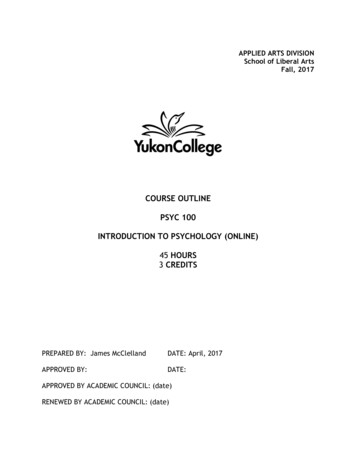
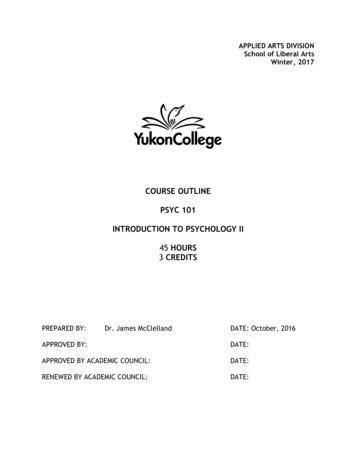
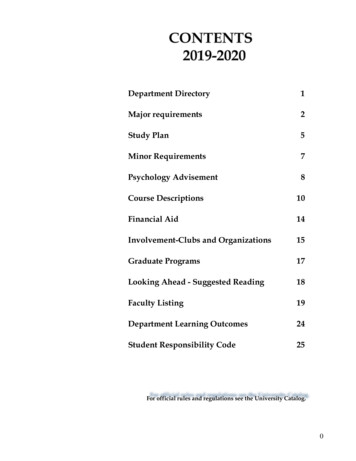
![Psychology [MA] [MA-PSYC]](/img/48/psychology-ma-2022.jpg)
